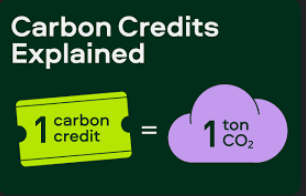Introduction
As the world grapples with the challenges of climate change, innovative solutions are emerging to mitigate the impacts of greenhouse gas emissions. One such solution is the concept of carbon credits. In this post, we will explore what carbon credits are, how they work, and their role in fostering environmental sustainability.
What Are Carbon Credits..?
Carbon credits are a market-based approach designed to reduce carbon dioxide (CO2) and other greenhouse gas emissions. The fundamental principle behind carbon credits is to assign a monetary value to each ton of CO2 emissions, allowing organizations to offset their carbon footprint. By purchasing carbon credits, businesses and individuals can support projects that reduce or remove an equivalent amount of greenhouse gases from the atmosphere. Learn more about the basics of carbon credits. learn more about carbon credits
what are the importance of Carbon Credits.?
The Importance of Carbon Offsetting Carbon offsetting plays a crucial role in combating climate change. It enables individuals and organizations to take responsibility for their emissions by investing in projects that actively reduce greenhouse gas emissions. These projects can include renewable energy initiatives, reforestation efforts, or energy efficiency improvements. Through carbon offsetting, we can neutralize the environmental impact of our activities and contribute to a more sustainable future.
Discover how carbon offsetting works.
what are the types of carbon credits..?
Types of Carbon Credits There are different types of carbon credits, including voluntary and compliance credits. Voluntary carbon credits are purchased voluntarily by organizations or individuals to offset their emissions beyond regulatory requirements. Compliance credits, on the other hand, are typically mandated by government regulations and are used to meet specific emission reduction targets. Understanding the distinctions between these types of credits is essential for navigating the carbon market.
Dive deeper into the various types of carbon credits.
what are the Role of Carbon Markets..?
Carbon markets facilitate the trading of carbon credits. They provide a platform for buyers and sellers to engage in transactions related to emissions reduction. By creating a financial incentive for emission reductions, carbon markets encourage businesses to invest in cleaner technologies and sustainable practices. This approach helps create a more efficient and cost-effective pathway toward reducing global emissions.
Understand the role of carbon markets in depth.
Evaluating the Benefits of Carbon Credits; Investing in carbon credits offers a range of benefits. Firstly, it allows organizations to take proactive steps toward sustainability by offsetting their carbon footprint. Secondly, carbon credits contribute to the development of renewable energy projects, forestry initiatives, and other sustainable endeavors. Finally, purchasing carbon credits can enhance a company’s reputation and demonstrate its commitment to environmental stewardship.
Explore the benefits of carbon credits in detail.
Getting Involved: Carbon Credit Projects Participating in carbon credit projects provides an opportunity for individuals and businesses to actively contribute to emissions reduction. Numerous projects exist worldwide, focusing on renewable energy generation, afforestation, and sustainable agriculture, among others. By supporting these projects through the purchase of carbon credits, we can drive positive change and foster a low-carbon economy.
Find out how to get involved in carbon credit projects.
Conclusion: Carbon credits represent a promising pathway toward a more sustainable future. By understanding the basics of carbon credits, the importance of carbon offsetting, and the role of carbon markets, we can make informed decisions to reduce our carbon footprint. Embracing carbon credits and supporting related projects allows us to take action against climate change and build a cleaner, greener world for generations to come. Join the movement towards environmental sustainability and make a difference today.
At Sokoine University of Agriculture education on Carbon trading is facilitated by the National Carbon Monitoring Centre (NCMC) which works under the Vice presidents office
but also through the department of ecosystem and conservation where various degree programs like BSc. Forestry are offered.

